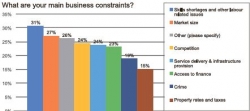
Ilembe Business Confidence Index (IBCI) - 2017 Mid-Year
‹ Back
Ilembe Business Confidence Index (IBCI) - 2017 Mid-Year
2017-09-06
Enterprise iLembe in partnership with the iLembe Chamber of Commerce, Industry & Tourism collaborate to produce the iLembe Business Confidence Index (iBCI) aimed at providing a biannual picture of business confidence in the iLembe District, as well as an overall business outlook.
Highlights and key findings
-
The composite iBCI recovered from its lowest level recorded at the year-end 2016, with the combined hybrid index (i.e. both the survey and activity indices) for the 1st half of 2017 gaining 4 index points compared to the 2nd half of 2016.
-
The iBCI 2017 Mid-Year was recorded at 49.5 index points, equalling the highest business confidence level recorded during the 2nd quarter of 2015. The iBCI however continues to remain in negative territory, i.e. below the neutral level of 50 index points.
-
The iBCI 2017 Mid-Year displayed the most significance variance recorded, since the commencement of the iBCI, between the survey component (expressing subjective business sentiment) and the activity index (reflecting actual economic activity within the iLembe District).
-
The activity index component was recorded at its lowest level ever, at 46.6 index points firmly entrenched in the negative.
-
The survey component of the iBCI, which was conducted during July 2017 was recorded at a high of 52.4 index points.
-
The Financial & Business Services, including IT & Communications sector was the most confident economic sector (57) followed by Tourism, Catering & Accommodation (55.8), Agriculture, Forestry, Hunting (54.8) and Construction, Property Development, Property Sales, which also includes Property Management (50.4).
-
The negativity of the iBCI activity index was severely impacted on by the US$ sugar price (-3.5%), tourism (-5.4%) and construction activity (-18.4%) being the biggest contributors.
-
The two market related indicators of competition and market size jointly remained the most significant business constraint selected by 51% of businesses. Sentiments that the local market is overtraded in certain sectors highlighted the need for competent and innovative business innovation and management, as well as the imperative of developing a diverse regional economy, with significant job creation potential.
-
31% of survey respondents listed skills shortages and other labour related issues as primary business constraints. The rapid development of technology and the workforce's inability to keep pace was also singled out in this regard.
-
Service delivery & infrastructure provision was a perceived business constraint of 24% of respondents. The cost of development, cumbersome administrative processes and speed of decision making were highlighted as specific contributors to this business constraint.
South African Chamber of Commerce and Industry (SACCI) BCI
-
The SACCI Business Confidence Index (BCI) averaged 95.0 (2015=100) in the 1st half of 2017 and increased by 1.4 index points on the 93.6 average for the 1st half of 2016. In the 1st half of 2017 the average of the SACCI BCI increased by 1.7 index points on average of 93.3 the 2nd half of 2016.
-
The major challenge for South Africa is firstly to escape the recessionary economic conditions and to adhere to matters listed by the credit rating agencies as hampering economic growth and improving employment opportunities. In this context, business and investor confidence are pivotal. The poor performance of the domestic economy in 2016 (GDP growth of 0.3%) and an anticipated 0.5% in 2017 are exposing the dire straits in which the economy finds itself.
In summary
The optimistic sentiment and expectations expressed by businesses in the district was a welcome antidote for the negative business climate and economic activity reflected in the Activity Index component of the iBCI. This optimism will be a much-needed brace against the subdued International Monetary Fund (IMF) outlook for South Africa, with political ambiguity and weak investor, consumer and business confidence leading to low growth projections for 2017 at 1% and 1.2% in 2018.
The private sector and all levels of government within the iLembe District are committed to partnering on specific initiatives that will aid the viability and growth of small and medium enterprises and secure investment in key economic sectors and geographies in our district.
Cobus Oelofse
CEO: iLembe Chamber of Commerce
T: 087 727 8630
ceo@ilembechamber.co.za
Nathi Nkomzwayo
CEO: Enterprise iLembe
T: 032 946 1256
nathi@enterpriseilembe.co.za
Richard Downing
Economist: Econdow
econdow@axxess.co.za
